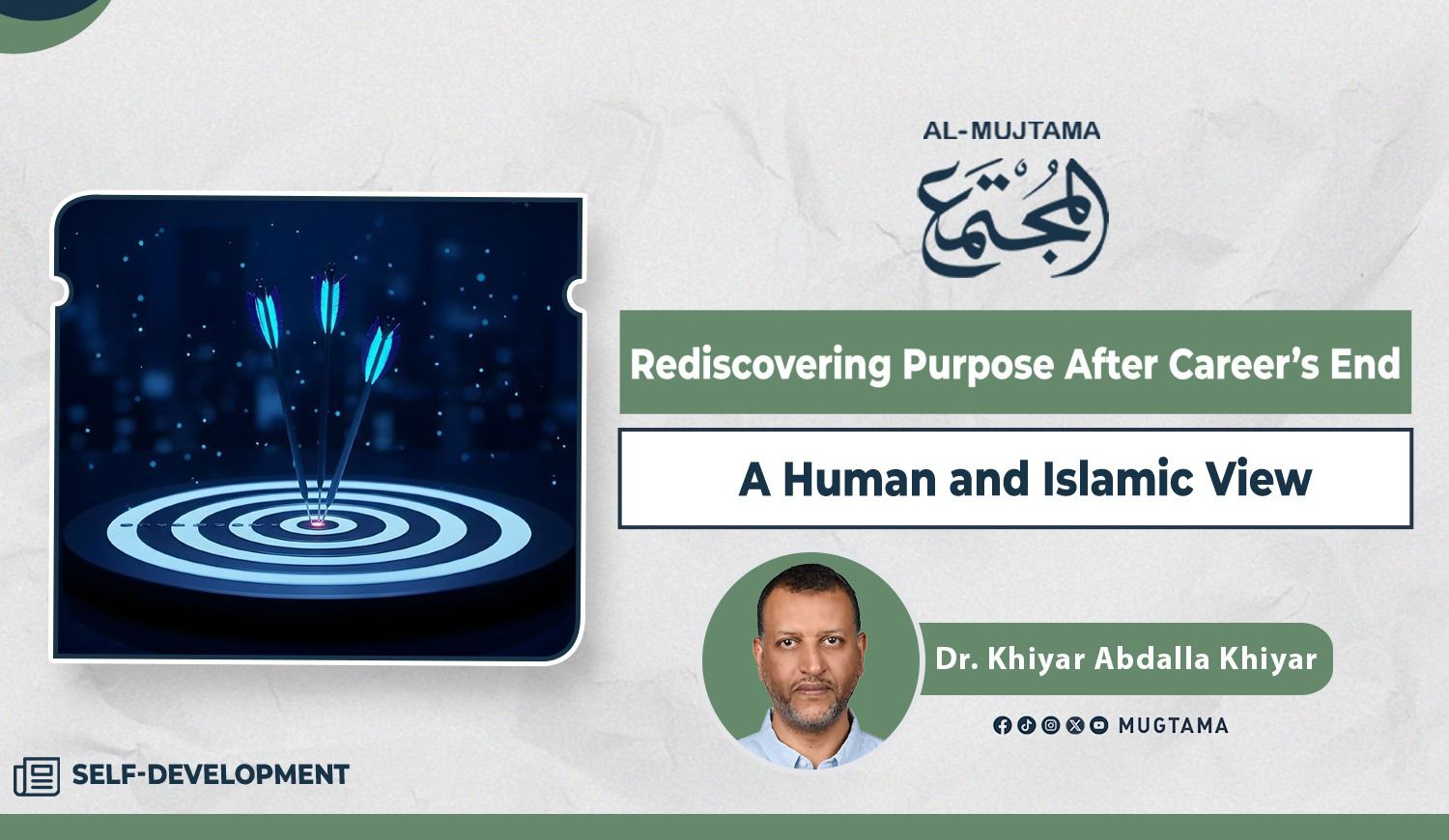Rediscovering Purpose After Career’s End… A Human and Islamic View

The end of a professional journey — whether
through retirement, resignation, or sudden termination — represents one of the
deepest transformations in a person’s life. It is not merely the loss of a job
or a salary; it shakes the very roots of one’s identity, belonging, and sense
of meaning. This is because work has been our mirror — the way we see ourselves
— the rhythm that orders our time, and the measure of our worth in the eyes of
others.
Yet Islam offers a deeper perspective on
this transition. It does not view it as a loss, but as a movement — from one
form of worship through work, to a broader form that embodies the essence of
human existence. “I did not create jinn and
humans except to worship Me.” (Adh-Dhariyat
51:56) No matter how professional roles change, the greater identity — that
of being a servant of Allah — remains constant and unshaken.
The Great Tree of
Identity
Often, our professional life is the “great
tree” that defines who we are and how others see us. Its roots give us
stability and meaning, its trunk provides daily order, and its branches offer
shade, social status, and recognition. But when this tree falls — whether by
choice or by circumstance — the space suddenly feels empty, and long-delayed
questions emerge: Who am I now? What remains when the job title disappears?
Studies show that job loss or retirement
can trigger waves of sadness, anxiety, and feelings of marginalization. This is
what happened to Robert, a factory manager who retired after 35 years of work.
He found himself immersed in a profound silence, hearing the echo of his
absence more than the sounds of the world around him. It wasn’t weakness, but
rather nostalgia for a self that once drew its sense of importance from work.
From Root to Essence
When professional identity trembles, its
impact extends beyond the individual — to family, friends, and partners. A
spouse discovers a companion now searching for meaning; grown children sense a
disruption in roles; colleagues drift apart. Yet Islam reorganizes this circle
around a new center — worshipping Allah in every role. When work changes, worship does not stop; it simply
takes on new forms — through service, teaching, and benevolence.
The Prophet (peace be upon him) said: “Be in this world like a stranger, or one who is
passing throug.” (Al-Bukhari)
The believer clings not to position, but to direction; not to means, but to
purpose. Work was a means — the true purpose is servitude, which encompasses
giving and striving at every stage of life.
Preparing for the
Fall and the Rise: Midlife Readiness for Transition
The best time to prepare for this
transition is midlife — in one’s forties or fifties — when experience,
connections, and the ability to rebuild are strongest. Here, human insight
meets Quranic guidance in a five-point roadmap:
1. Adopt the mindset of an explorer and a
pilgrim:
Don’t confine yourself to one role. Explore new avenues of learning and
service. Life in Islam is not a linear career path, but a journey of servitude
expressed in many forms.
2. Stay professionally ready:
Observe your environment, update your skills, and renew your intention so every
achievement becomes an act of worship, not routine. The Prophet (peace
be upon him) said: “Actions are are by intentions.”
3. Build both financial and spiritual safety
nets:
Just as experts advise saving for several months’ expenses, the Quran calls to
trust in Allah’s provision: “There is no moving
creature on earth whose provision is not guaranteed by Allah.” (Hud
11:6)
Balance between taking practical means and reliance on Allah brings
tranquility.
4. Strengthen psychological resilience through
faith and connection:
Engage in reflection, remembrance, physical activity, and meaningful social
interactions. As your awareness grows that your worth isn’t defined by salary
or status, your soul becomes freer and stronger.
5. Diversify your identity and fields of
contribution:
As investments are diversified to reduce risk, expand your areas of giving —
teaching, volunteering, mentoring, creativity, family, and da‘wah. Each branch
nourishes your inner forest with new sources of meaning and belonging.
The Islamic
Perspective on Transformation: From Career to Mission
Islam views work as an act of worship when
done in obedience to Allah. Retirement, therefore, is not the end of worship —
it can mark the beginning of a purer phase of service and benefit to others.
The focus shifts from earning income to earning reward, from building a
professional résumé to building an eternal record.
In this stage, the deepest identity — the
servant of Allah — shines most clearly. It is the root from which all other
roles grow. When the branch of work falls, the tree of faith remains alive. The
Companions exemplified this truth:
Abu Bakr (may Allah be pleased with him)
was not merely “the merchant,” but As-Siddiq — the truthful one who led
the ummah with the spirit of servitude.
‘Umar ibn al-Khattab (may Allah be pleased with him) was not just “the ruler,”
but the servant of the ummah who feared accountability more than he desired
authority.
Cultivating the Inner
Forest
Liberation begins when we realize we are
not a single tree, but an entire forest of values and relationships. Work was
the tallest tree — but not the whole forest. The true forest contains the tree
of family, the orchard of friendships, the tree of knowledge, the tree of
health, and the tree of worship. When we nurture them all in balance, we become
richer in identity and stronger in roots.
Draw your own forest map: Where do you
contribute? What do you learn? Whom do you serve? Plant new trees whenever
possible, and involve your family in this journey so they become partners in
your growth, not mere witnesses to your fading.
Restoring the Sense
of Meaning: Returning to Allah, Not to the Role
The end of work is not the end of
significance — it is its transformation. True worth is not in title or
position, but in sincerity and impact. When you reorder your priorities through
the lens of worship, loss becomes a fertile space for renewal.
Those who think with a tree mindset
fear falling. Those with a forest mindset see every fall as the start of
new growth. And those who live by the servant’s mindset see in every
stage a chance to draw nearer to Allah: “Even
though the Hereafter is far better and more lasting.” (Al-A`la 87:17)
You were never just a single tree — you are
a flourishing forest waiting to be discovered. Let the years after work become
the most beautiful chapter of your story, and the closest to your eternal
purpose — to live and die upon the meaning of true servitude to Allah.
-------------------------------------------------------------
Read Also:
-
Beware of 4 Negatives in Your Forties











